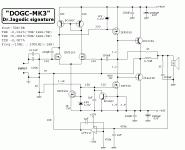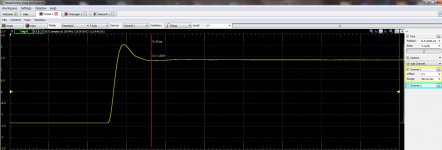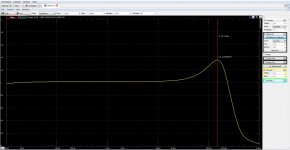Hmm
I wonder so, my power supply is 2x37ac (old trafo on 220V), sometimes its +- 53Vdc. AC lines can show 223-234Vac. Irfd110 has Vds100V, can it be the reason of burning?
Do you have proper heatsink on input mosfets? You should hold you hand on the heatsink, otherwise it is too hot.
Do you have proper heatsink on input mosfets? You should hold you hand on the heatsink, otherwise it is too hot.
http://www.diyaudio.com/forums/solid-state/195351-80w-hybrid-audio-amplifier-6.html#post4119615
I will try, and incrase Irfd110 capacitor, maybe it will help for future .
Or add a capacitor to 100k resistor, (input/gnd,150pF), mayby a hi frequency is gaining when Im turning off.
Update.
I forgot to mention, there are two monoblocks, and one that breaks down, the transformer shows 2x37VAC, the other is 2x36V and does not show this propensity of burning irfd110 on input side.
Last edited:
An externally hosted image should be here but it was not working when we last tested it.
Instead of 630/9630, IRF530/9530 can be used?
Instead of 630/9630, IRF530/9530 can be used?
Yes, no problem.
Yes, no problem.
Thanks a lot. 530/9530 are 100v devices. Is it enough for ±48v?
Thanks a lot. 530/9530 are 100v devices. Is it enough for ±48v?
It should be OK.
Attachments
To avoid playing with the frequency compensation (which you should do if you adjust the gain by playing around with the feedback resistors), why not just add 100K in series with the input?
With the roughly 100k already there, the gain is chopped in half.
Sure, you'll take a little noise hit, but what's a little noise between friends?

mlloyd1
With the roughly 100k already there, the gain is chopped in half.
Sure, you'll take a little noise hit, but what's a little noise between friends?
mlloyd1
Input mosfet oscillation
Hi,
I have scoped my two DOGC-H amplifiers and one board has oscillation starting above 5V of output. I discovered that removing 220pF capacitor across gate and drain on input mosfet eliminates the problem. Other boards have no oscillation with 220pF installed.
What could be the problem? Every board is the same - same layout, same components.
Thanks.
Hi,
I have scoped my two DOGC-H amplifiers and one board has oscillation starting above 5V of output. I discovered that removing 220pF capacitor across gate and drain on input mosfet eliminates the problem. Other boards have no oscillation with 220pF installed.
What could be the problem? Every board is the same - same layout, same components.
Thanks.
Hi,
I have found source of oscillation - it was protectione 12v zener. I had to solder it directly to the mosfet pins. Interesting is that other channel does not have this problem and PCBs are identical.
Anyway I have scoped the amplifier with square wave and there is quite a bit of overshoot. What is causing this? How can I tame it?
I have found source of oscillation - it was protectione 12v zener. I had to solder it directly to the mosfet pins. Interesting is that other channel does not have this problem and PCBs are identical.
Anyway I have scoped the amplifier with square wave and there is quite a bit of overshoot. What is causing this? How can I tame it?
Attachments
Hi,i am interested to build this ....
I have a few questions...
1) can i use irf560 with irfd9630..
Although i have to switch to the smd version of some components like the opamps...(change footprints on pcb)..
I get the files from above mentioned post,if any modifications needed.plz help me... ty.
I have a few questions...
1) can i use irf560 with irfd9630..
Although i have to switch to the smd version of some components like the opamps...(change footprints on pcb)..
I get the files from above mentioned post,if any modifications needed.plz help me... ty.
Just want to point out where and when the things started...
15th December 2005, the first version of DoGC:
Death of Gain Clone
And the last published here, on diyaudio forum:
Death of Gain Clone
I have a new, updated version which is also a DC amp with very good temperature compensated DC offset at
the output (≤ ±30mV) and a better class A driver (two versions - Hitachi LMOS 2SJ76/7/8/9 or Toshiba 2SJ313).
15th December 2005, the first version of DoGC:
Death of Gain Clone
And the last published here, on diyaudio forum:
Death of Gain Clone
I have a new, updated version which is also a DC amp with very good temperature compensated DC offset at
the output (≤ ±30mV) and a better class A driver (two versions - Hitachi LMOS 2SJ76/7/8/9 or Toshiba 2SJ313).
Last edited:
I have been looking forward to build Dogc h amp for some time now. I had downloaded pcb design for Dr Boras website when it was working last time. Has anyone built that version of the amp since that layout is different from the one shared here. I have few MJl 21193/94 transistors which i will be using with this amp.
Hi viki_v2,
I had planned to build DoGC-H, and downloaded all the files from Dr. Boras Website for DoGC and DoGC-H. A couple of weeks later, I decided to go for the regular DoGC-MK3 and I build it. Layout, PCB, and schematics were just perfect. I have no doubt, that this will be the same with Dr. Boras DoGC-H files. The differences are not so fundamental in my opinion.
Have fun building it. I never regret it
Michael
P.S.: Since Dr. Boras Website is down, I attached the files I were using.
I had planned to build DoGC-H, and downloaded all the files from Dr. Boras Website for DoGC and DoGC-H. A couple of weeks later, I decided to go for the regular DoGC-MK3 and I build it. Layout, PCB, and schematics were just perfect. I have no doubt, that this will be the same with Dr. Boras DoGC-H files. The differences are not so fundamental in my opinion.
Have fun building it. I never regret it
Michael
P.S.: Since Dr. Boras Website is down, I attached the files I were using.
Attachments
Hi viki_v2,
I had planned to build DoGC-H, and downloaded all the files from Dr. Boras Website for DoGC and DoGC-H. A couple of weeks later, I decided to go for the regular DoGC-MK3 and I build it. Layout, PCB, and schematics were just perfect. I have no doubt, that this will be the same with Dr. Boras DoGC-H files. The differences are not so fundamental in my opinion.
Have fun building it. I never regret it
Michael
P.S.: Since Dr. Boras Website is down, I attached the files I were using.
Thank You
- Home
- Amplifiers
- Solid State
- DOGC-H by Dr. Jagodic



